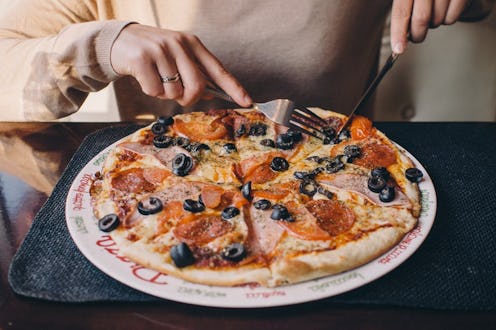Life
Free Pizza Makes You More Productive At Work, According To Science
Attention all employers: There’s a new report on employee productivity that we’re going to need you to read by end of day, thanks. It suggests that pizza and compliments make employees more motivated at work. This is according to new research as well as the continuing research of anyone who’s ever been the recipient of either pizza or compliments.
As New York Magazine’s The Cut reports, this new study comes from psychologist Dan Ariely and was published in his new book Payoff: The Hidden Logic That Shapes Our Motivations. Ariely’s research focused on a group of workers who assembled computer chips at a technology company in Israel. In order to learn about worker motivation, Ariely’s participants were sent one of three messages at the beginning of the week, each promising an incentive for hitting the goals of the days.
One group was promised a small monetary bonus of about $30 US; another was promised pizza; the third group was told they would receive a compliment from their boss via text message. A fourth group acted as a control and received no promised incentive to influence their motivation. Because the employees produced a tangible output — a daily amount of assembled computer chips — Ariely was able to measure their motivation by number.
The winner? Initially, pizza.
Productivity of employees promised pizza at the end of the week increased by 6.7 percent in the first day, compared to the control group. Compliments were a close second at 6.6 percent. The promise of dollar bills only saw a productivity increase of 4.9 percent. The group incentivized with the cash bonus saw an even steeper decline in motivation the second day, performing 13.2 percent worse than the control group. While productivity evened out throughout the week, the group promised a cash bonus ended up 6.5 percent less productive than the control group. Money over everything except pizza and compliments and literally having nothing, I guess.
Previous studies have found similar conclusions about money as a motivation. Though increased motivation is often used as an explanation for excessive bonuses among higher-ups, multiple studies suggest money isn’t the best motivator for employees. In fact, intrinsic motivations (like compliments) have often been found to be more effective as a way to actually make people want to work harder.
In Ariely’s study, compliments proved to be the winner at the end of the week, with pizza as a close second. While the increase in motivation wasn’t huge, employees in the pizza and compliments groups were still more productive than the control group. As noted by The Cut, Ariely thinks pizza would have won out had his initial plan of delivering the pizza directly to employees’ homes happened. “This way … we not only would give them a gift, but we would also make them heroes in the eyes of their families,” he writes in his book.
I guess the only answer is to do more research involving pizza and compliments, and I will happily be the recipient of both. For the sake of science, obviously.
